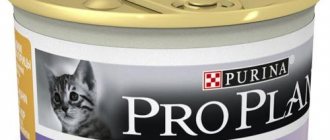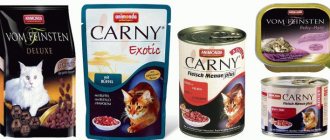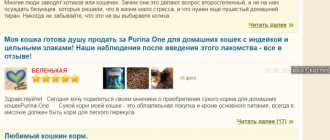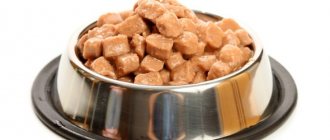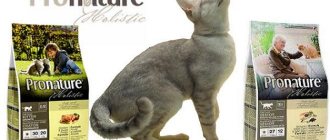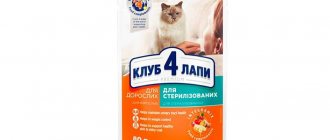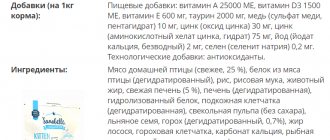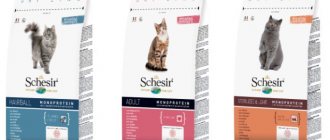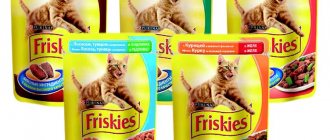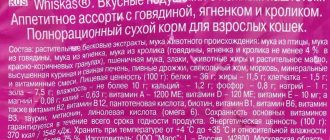Some cats are predisposed to gastrointestinal disturbances, which manifest as diarrhea or vomiting. Typically, intolerance is caused by wheat or corn gluten. There may be cases of allergic reactions to different types of meat. To protect the pet from health problems, the owner will have to choose the optimal food, which is labeled as such: for cats with sensitive digestion.
Special digestion
At the age of approximately two months, the kitten is separated from its mother and gradually transferred to ready-made food. It is at this time that the owner may notice that his pet has stomach problems. Symptoms of difficult digestion may include:
- lack of appetite, the cat refuses to eat;
- flatulence, problems with stool, strong odor;
- vomit.
If your kitten is bothered by any of this list, we recommend visiting a veterinary clinic . The specialist will determine that the symptoms were not caused by another serious illness: colitis, pancreatitis, inflammation of the intestines or stomach. It is also necessary to exclude the possibility of food poisoning. Only after this can the veterinarian make a diagnosis and give recommendations for further diet planning.
List of popular diets
Following fashion, almost all brands include food of this type in their range, but the quality of many of them is frankly low. In order not to study hundreds of different diets, you should pay attention to the best representatives of the pet food industry. Judging by the reviews on the Internet, you can make an approximate list of the most popular diets:
- GO! Sensitivity&Shine;
- Grandorf White Fish & Potato Adult Sensitive;
- Arden Grange Sensitive;
- Eukanuba Intestinal Formula;
- Josera SensiCat;
- Brit Care Cat Lilly Sensitive;
- Gina Elite Cat Sensitive;
- Leonardo Adult Grain Free;
- Hill's Science Plan Sensitive Stomach;
- Royal Canin Sensible 33;
- Pro Plan Delicate;
- Bozita Feline Funktion Sensitive Diet & Stomach.
Each of these diets deserves attention, but in order to understand what it is made of and why it is good, you need to consider them in detail individually.
Nutrition for a sensitive gastrointestinal tract
The life and health of a cat largely depends on proper nutrition.
The problem of digestive sensitivity must be solved by choosing a diet. It must contain probiotics that improve the microflora of the stomach and intestines, stabilize processes and normalize stool. An important parameter is the careful selection of ingredients. Cats with sensitive digestions are also prone to allergies. Such feeds should not contain anything that is likely to cause intestinal upset or irritation in the animal.
At the same time, we should not forget that animals with problems in the gastrointestinal tract cannot be fed from the table, because this is harmful to their already poor health. The food must be complete and fully satisfy the body’s needs for energy, proteins, fats, minerals and vitamins.
Reviews from veterinarians
Vladimir Bagryantsev, veterinarian, 17 years of experience:
“Special diets for sensitive digestion are not a whim or a fashion statement. There are animals for whom this is the only salvation. I always prescribe similar diets for disorders, even if the dysfunction is temporary and not chronic. Even healthy cats sometimes benefit from eating an easily digestible diet, and not once again overloading the body with heavy proteins and carbohydrates.”
You can also contact our site's staff veterinarian, who will respond to them as soon as possible in the comment box below.
Food for cats with sensitive digestion
Almost all manufacturers have food labeled “for sensitive digestion” in their product line. They, like regular diets, differ from each other in quality, price, and ingredients. When choosing the best food on your own, you should carefully compare all these characteristics, as well as read reviews from veterinarians and other cat owners.
Leonardo Sensitive Adult food
Super-premium dry food for cats with special digestion.
The line has three flavors: duck and rice, lamb and rice, fish and rice. The food contains at least 30% dehydrated poultry and 25% rice. It also contains flax and grape seeds, yeast extract, wheat starch, rye malt and powdered eggs. It also contains vitamin A, D3, E, copper, taurine, lecithin, in quantities recommended by famous experts.
Crude protein accounts for 32% of the feed composition, and 85% of this protein is of animal origin.
Brit Premium Sensitive food
Premium Czech hypoallergenic food with lamb flavor is sure to please your pet. It contains lamb, turkey and rice, which makes it great for cats with digestive problems. The composition also includes probiotics, plant extracts, and yeast. Filled with vitamins A, C, D3 and other microelements.
The energy value of 3800 kcal per kg allows this food to be used as a complete food, and the complex of vitamins and minerals in the composition makes it possible not to use any additives.
Savarra Sensitive Cat food
Food containing the highest percentage of natural meat. Does not contain soy, corn, GMO by-products, gluten. There are no artificial colors or preservatives in the composition. 74% of the composition is lamb and salmon meat. The product is completely hypoallergenic .
Contains all the necessary vitamins. The only disadvantage of this holistic food is its inaccessibility: due to the high price, it is not available in every veterinary store. It would be best to order food directly from the UK, because in this case you will definitely not receive a fake.
Royal Canin Sensitivity Control food
Wet food, packaged in 100 gram portions. This makes it convenient to comply with feeding standards. Contains chicken meat and liver and rice. Recommended for cats with food intolerance, allergies, skin problems, dermatitis. Not recommended for nursing or pregnant pets .
Purina Pro Plan Delicate
An easily digestible turkey pate for cats with digestive problems. Quite a low percentage of meat, only 14% turkey. It also contains preservatives, thickeners, and artificial antioxidants, which indicates that the quality of the food is not very good. An adult cat needs 3-4 cans per day, which significantly increases the final cost of food. It is better to use other, more expensive, but high-quality and high-calorie feeds.
How to calculate the portion of food per day
You need to calculate the amount of food based on several factors: the cat’s age, its weight, activity and breed. Usually the manufacturer prints a table on the packaging that helps calculate the weight of a serving per day. The owner divides this weight into an equal number of meals.
The daily norm for kittens up to six months is calculated proportionally according to the principle: a larger amount of food relative to body weight, with age it decreases. Babies need to be fed at least four times a day.
Feeding standards differ for cats that eat only dry or only wet food. Sometimes owners feed their pets both. In this case, it is better to make the correct calculation together with a veterinarian.
Approximate calculation of the amount of dry food per day:
| Weight, kg) | Daily serving (g) | Kitten age (months) | Daily serving (g) |
| 3 | 45 | 1-2 | 30-50 |
| 4 | 55 | 2-4 | 40-65 |
| 5 | 65 | 4-6 | 55-70 |
| 6 or more | 12 g per 1 kg of weight | 6-12 | 60-80 |
Approximate calculation of wet food per day:
| Weight, kg) | Daily requirement (g) | Kitten age (months) | Daily requirement (g) |
| 3 | 190-200 | 2-3 | 170-210 |
| 4 | 230-240 | 3-6 | 210-300 |
| 5 | 250-260 | 6-9 | 210-300 |
| 6 or more | 300 | 9-12 | 170-255 |
If the cat is very active, the daily portion can be increased by 15-20%. The opposite situation: animals suffering from excess weight are fed a little less. The same applies to older cats whose appetite decreases.
The role of nutrition in the treatment of gastrointestinal diseases
Proper nutrition is the basis for the treatment of diseases of the gastrointestinal tract. All kinds of modern medicines, of course, help, but their effect will be nullified if you do not change your unhealthy lifestyle and continue to eat harmful foods.
The diet may have the following clinical effects:
- using the right products you can regulate acidity;
- activate and normalize gastric motility;
- improve digestive function;
- cleansing;
- mucosal regeneration;
Light foods for the stomach
Products that are good for the stomach should be consumed by patients with gastrointestinal diseases in the acute stage and in remission.
Those with a sweet tooth are allowed to eat savory cookies, yeast-free buns, and pies. The baked goods must not be fresh, but yesterday’s or dried. You can eat marshmallows and marshmallows in small quantities.
It is better to choose lean varieties of meat, such as chicken, turkey, beef, and rabbit. The same applies to fish. These products are more easily absorbed in the intestines. The meat can be eaten simply boiled or baked, or you can prepare various dishes without using oil, for example, steamed cutlets, zrazy, and meatballs.
It is useful to consume dairy products, especially cottage cheese. You can use it to make cheesecakes and casseroles. You are allowed to eat a little hard low-fat cheese.
Among the drinks, it is useful to drink rosehip decoction, weak tea with milk, fruit and vegetable juices.
It is better for patients with diseases of the gastrointestinal tract to consume vegetables and fruits after heat treatment, boiled, baked, steamed. Vegetables are especially beneficial for the stomach. For example, beets, cauliflower, pumpkin, carrots and potatoes.
How do medicinal ones differ from regular ones?
Veterinary diets differ in composition from conventional feeds. This may be either an increased amount of special additives or microelements, or the absence of ingredients potentially harmful to the dog’s health.
A distinctive feature of medicinal feeds is that they are consumed for a limited time. Until the pet is completely healthy. You can find out more about the terms of use directly on the product packaging.
When is medicated food prescribed?
Therapeutic diets are prescribed in the following cases:
- with gastritis;
- for food allergies;
- for gastrointestinal diseases;
- for liver disease;
- for kidney disease;
- for dermatoses (irritations of the skin and fur);
- with urolithiasis;
- cardiovascular diseases;
- oskalata, pancreatitis.
The most common reason for prescribing specialized food is an allergy to certain ingredients. The veterinarian determines what the dog is allergic to and prescribes the appropriate diet.
Veterinary diets are often prescribed for older dogs. This is due to the emergence of numerous health problems during the aging process. First of all, this concerns joint diseases.
